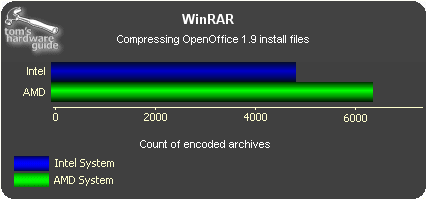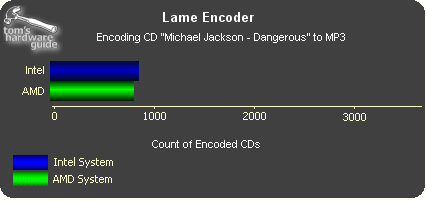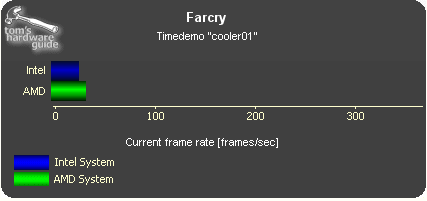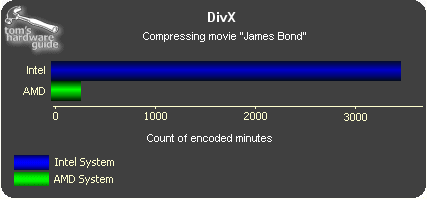Dual Core Stress Test: AMD vs. Intel
Tuesday, June 14 Update
Tuesday, June 14 2005: A new day with several events. Intel, which had examined the motherboards (D955XBK) from our test, contacted us in the morning. According to the company, the boards are running flawlessly in its labs. Intel sent a technician to the THG lab in the afternoon to get detailed information about the motherboard problems we experienced a week ago. After a few test runs, the cause of the failures was found: The boards simply do not work with every DDR2 memory, which allowed Intel to at least partially reproduce the events. Especially some of our DDR2 modules - some of which are review samples - do not work with Intel's D955X motherboard.
For our tests, we reset our counters to zero once again to enable further examinations. Let's also review our performance results from previous days. In the file compression tests, the AMD system leads with 6435 created archives compared to 4906 archives for the Intel system. AMD also leads in our FarCry race. Intel however leads the MP3 encoding competition: It finished 894 Michael Jackson CDs, while the AMD unit counts 837 CDs. We also saw a significant advantage for the Intel system for the DivX encoding of the James Bond movie. Intel leads with 3950 minutes, AMD clearly trails with just 300 minutes.
A summary of results for systems is shown in the charts below.
As announced previously, we will examine the unequal load balancing of the AMD system within DivX encoding activities. We have restarted both systems and shut down Hyperthreading in the Intel system - resulting in only two physical CPU units, matching the AMD system. Perhaps we will get an answer why the AMD system allocates a low priority to Divx encoding. Perhaps this effect is caused by the operating system and re-scheduling events as a result of different core and application numbers.
There is yet another change of the configuration of the Intel system. Since the Asus board did not allow a deactivation of Hyperthreading, we are using another Intel board (D955BK). Unfortunately, this board does not grant access to data of fan speeds and supply voltages. As a result, these data will not be listed in the charts.
So as our tests continue and as we gain more experience with the dual core systems, here is what we will be doing in the coming days. First, we will put a full load on both systems using one application for several hours. This will allow us to see which platform does especially well in certain applications such as gaming, audio and video encoding and file compression. We will follow this with a series of tests that will run four applications simultaneously. This time, DivX will be run with higher priority.
Thanks for your continued interest and all your emails and comments.
Get Tom's Hardware's best news and in-depth reviews, straight to your inbox.
Current page: Tuesday, June 14 Update
Prev Page Log Book: Intel Sans Hyperthreading - New Results From DivX Next Page Lessons Learned From The Dual-Core Stress Test - David Strom


